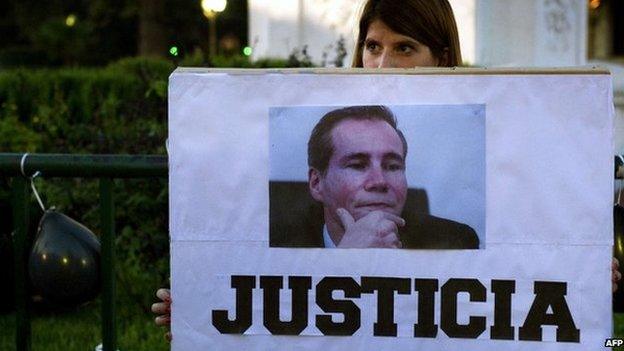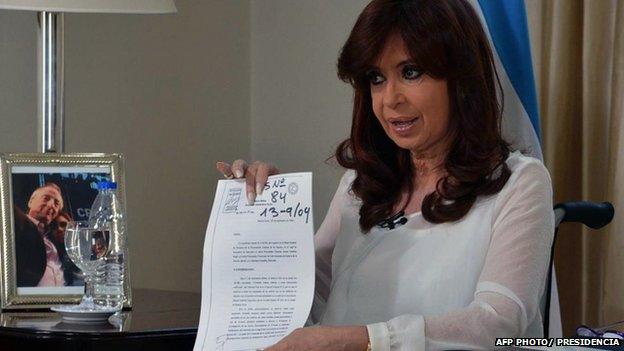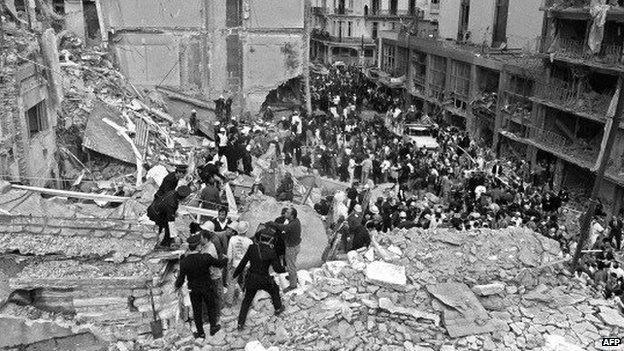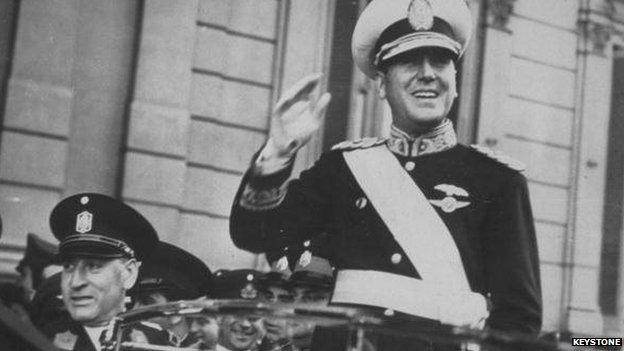Fear and loathing: Argentina's infamous spy agency
- Published

The death of Mr Nisman triggered calls for the intelligence service to be dissolved
The death in Argentina of special prosecutor Alberto Nisman, who was found with a bullet in his head hours before presenting evidence before Congress against President Cristina Fernandez de Kirchner, has led to plans to overhaul Argentina's infamous intelligence service.
Days after Mr Nisman's body was found on 18 January, Ms Fernandez said his death was part of an intelligence "operation" to harm her government.
On Monday, Ms Fernandez announced the creation of a new body to replace the Intelligence Secretariat (SI), more widely known by its previous initials, Side.

The Argentine president said Mr Nisman's death was part of a plot to discredit her
She said the leadership of the new Federal Intelligence Agency would be chosen by the government but would be subject to senate approval.
"We must work to reform the Argentine intelligence system because the one we have has not served the interests of the nation," she announced in a national address.
Shady history
The SI is one of Argentina's most feared and hated state agencies.
Created in 1946 by Argentina's strongman General Juan Domingo Peron, it was originally a civilian intelligence agency called the Information Division.
According to journalist Uki Goni, its first task was to arrange the post-war transport of Nazi war criminals to Argentina.
The service evolved into a secret police force under Argentina's military rule (1976-1983), and was used by the military junta to track down opponents and spy on anyone considered subversive.
That included students, trade unionists and left-wing activists.
Since then, the SI has been viewed by Argentines as a seedy, dark and powerful organization.

Mr Nisman was investigating the 1994 bombing of a Jewish centre in Buenos Aires
Critics allege that following the return to democracy in 1983, the SI changed into a spy agency used by successive governments to monitor the activities of opponents, journalists, judges and prosecutors.
Intelligence expert Luis Alberto Somoza told the BBC that in the past years the SI was used mainly for political or personal espionage.
"Everyone in power used their intelligence activities for their own purposes and now they are paying the price," he said.
Wikileaks founder Julian Assange told Argentine news site Infobae the country had one of "the most aggressive surveillance regimes" in Latin America.
Ms Assange also warned that the government of President Fernandez had hired a large number of "surveillance companies".
No control
The Civil Rights Association of Argentina and other NGOs have expressed their concern at what they see as a lack of control over the intelligence services.
The sole parliamentary body in charge of supervising their activities, a commission led by a governing party legislator, met only twice in 2014 and has been inactive for a year, according to reports in the local press.

The SIDE were created by former President Juan Peron
The number of people currently working for the Intelligence Secretariat is kept secret, as is the amount of specific funding it receives from the government.
Last December, President Fernandez replaced the agency's long-serving heads with some of her close allies.
Government officials say Mr Nisman's death and the alleged plot against the government might be related to this reshuffle.
The president's critics say the creation of the Federal Intelligence Agency alone will not be a safeguard against future misuse of the intelligence services.
They question Ms Fernandez's plans to move oversight of all wiretaps from the intelligence services to the General Attorney's office, pointing to the close ties between the government and the current General Attorney.
Opponents also fear the government will continue its spying activities, merely moving it from the civilian spy agency to the armed forces.
As evidence, they point to the nomination of intelligence expert Gen Cesar Milani to the post of army chief and the fact she has since assigned the largest portion of Argentina's annual intelligence budget to the army.
So while plans to disband the feared SI were widely welcomed, Argentines appear doubtful whether the creation of a new agency will be the answer.